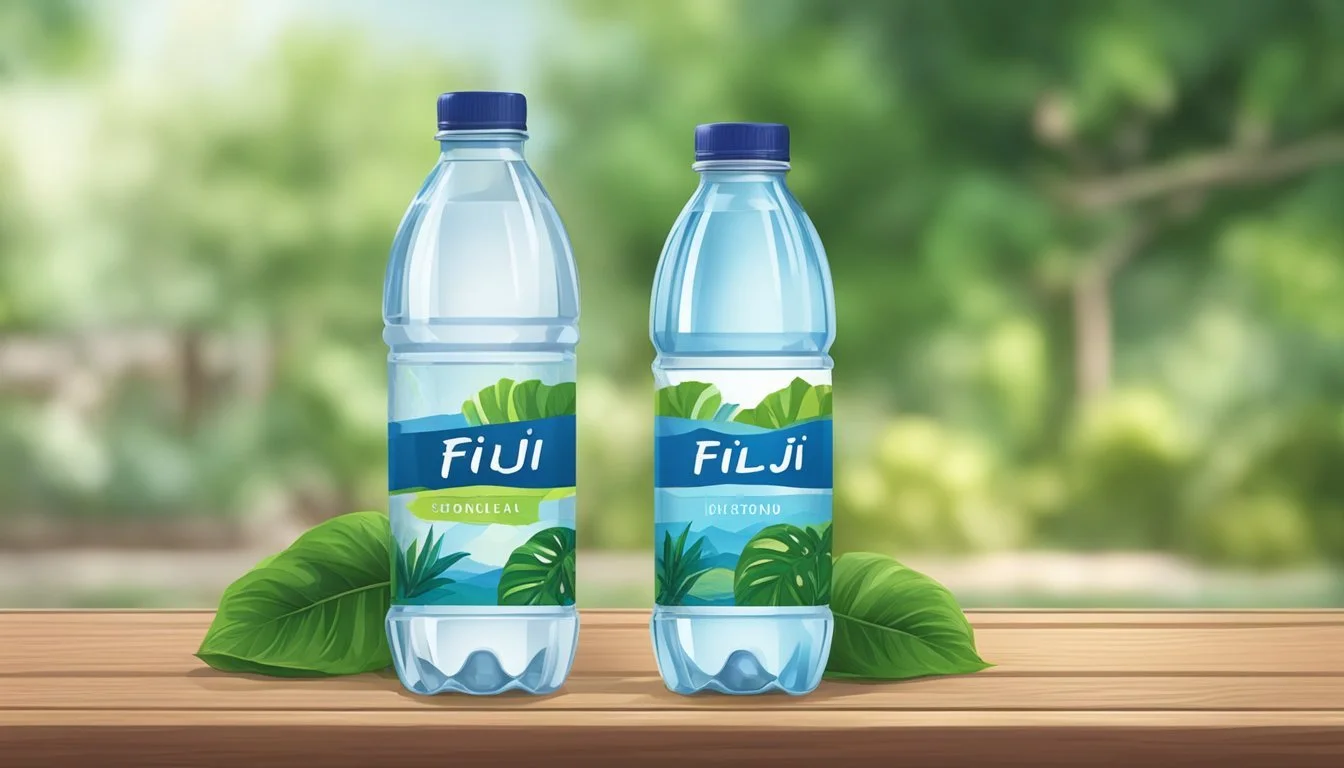Fiji vs. Purely Sedona
Comparing the Best Bottled Waters
When it comes to premium bottled water, two names often rise to the top: Fiji and Purely Sedona. Fiji Water, sourced from an artesian aquifer in the remote Fijian Islands, is known for its soft, smooth taste and high silica content, making it a favorite for those seeking a luxurious hydration experience. Purely Sedona, on the other hand, hails from the pristine springs of Sedona, Arizona, and promises a crisp, refreshing taste due to its naturally occurring minerals.
Fiji Water's distinct flavor profile and exotic origin have garnered it a loyal following, but Purely Sedona's commitment to purity and its rich mineral content make it a strong contender for those who prioritize natural spring water. The debate over which is better often boils down to personal preference and what one values more in their bottled water—exotic appeal and smoothness or local sourcing and a crisp finish.
Readers looking to make an informed choice between Fiji and Purely Sedona will find that both waters have unique qualities that cater to different tastes and preferences. Each brand offers its own distinct benefits, making the decision a matter of personal lifestyle and taste.
Understanding Bottled Water
Bottled water comes in various types, each differing in source and treatment process. Regulatory frameworks ensure quality and safety standards for bottled water.
Types of Bottled Water
Bottled water is categorized based on its source and how it has been processed. Spring water and artesian water are sourced from natural springs or artesian wells, respectively. Mineral water contains naturally occurring minerals without undergoing extensive processing. Purified water undergoes rigorous filtration processes, such as reverse osmosis or distillation, to remove impurities. Alkaline water is treated to have a higher pH level than regular tap water, often marketed for its potential health benefits. These distinctions help customers choose water that fits their preferences and needs.
The Role of Source in Quality
The source of bottled water significantly impacts its quality and characteristics. Spring water is often prized for its natural origin and balanced mineral content. Artesian water benefits from being naturally filtered through rock layers, which can enhance its purity. Water sourced from artesian aquifers, such as Fiji Water, is valued for its nutrient profile. Conversely, the quality of tap water can vary based on local infrastructure and treatment practices. Knowing the source helps consumers make informed choices about bottled water’s taste and mineral content.
Bottled Water Regulations
Regulations play a crucial role in ensuring the safety and quality of bottled water. In the United States, the Food and Drug Administration (FDA) oversees bottled water standards, ensuring that it meets stringent safety criteria. These regulations cover labeling, contaminant levels, and source protection. Tap water is regulated by the Environmental Protection Agency (EPA), which enforces similar safety measures. Bottled water must conform to specific guidelines regarding its processing, bottling, and distribution, providing consumers with confidence in its safety and quality. These standards ensure that different types of water, whether mineral, purified, or artesian, are safe to drink.
Profile Analysis
Fiji and Purely Sedona are renowned bottled water brands, both offering unique qualities in taste and mineral content. The sections below compare their taste profiles, mineral content, and pH levels, providing a comprehensive overview.
Taste and Mouthfeel
Fiji Water is often noted for its smooth and silky texture, attributed to the natural artesian aquifer source it comes from in Fiji. The silica content in Fiji Water contributes to its distinct mouthfeel, making it a preferred choice for those who enjoy a subtly luxurious drink. Many consumers describe the taste as being clean and crisp.
Purely Sedona, sourced from the Oak Creek Canyon in Arizona, offers a different experience. It retains a fresh, slightly sweet taste with a balanced texture. The natural filtration process through volcanic rock gives it a pure, refreshing quality that appeals to taste purists. This brand is praised for its neutral taste, free from any aftertaste, making it versatile for various consumption preferences.
Mineral Content Comparison
Fiji Water contains a distinct blend of minerals such as silica, calcium, and magnesium. These minerals not only contribute to the taste but also offer potential health benefits. The silica content, around 93 mg/L, is particularly high, adding to its smooth texture and reputed skin benefits. Magnesium and calcium levels enhance the electrolyte balance, supporting bodily functions.
Purely Sedona also boasts an impressive mineral profile. Its water is naturally high in calcium and magnesium, although it contains less silica compared to Fiji. The higher calcium content can be beneficial for bone health, while the magnesium aids in muscle function and hydration. This brand focuses on maintaining a natural mineral balance, providing a refreshing and health-oriented choice.
PH Levels and Alkalinity
Fiji Water has a pH level of about 7.7, making it slightly alkaline. This alkalinity is beneficial for neutralizing acidity in the body, thus supporting overall health. The balanced pH level is also a factor in its crisp and refreshing taste, making it a favorite among those who monitor their pH intake.
Purely Sedona features a pH level that ranges between 7.5 and 8.5, situating it firmly in the alkaline category. This higher alkalinity is celebrated by health enthusiasts who believe it aids in digestion and detoxification. The slightly higher pH level compared to Fiji Water positions it well for those seeking an alkaline water choice without compromising taste.
Health and Safety Considerations
Fiji and Purely Sedona both present unique health and safety profiles, focusing on aspects like total dissolved solids (TDS) and potential contaminants. Here are the crucial points to consider for both brands from a health and safety perspective.
Understanding TDS
Total dissolved solids (TDS) measure the combined content of inorganic and organic substances in water. Fiji Water has a TDS level of approximately 222 mg/L, attributed to its artesian aquifer source, which contributes to its mineral content.
Purely Sedona, meanwhile, boasts a TDS level of about 150 mg/L. Lower TDS can often indicate fewer minerals but does not necessarily mean better quality. The balance of minerals in both waters plays a role in their overall taste and potential health benefits, though individual preferences may vary.
Contaminants and Purity
Fiji Water has faced scrutiny over contaminants such as endocrine-disrupting chemicals due to its plastic packaging. There was also a recall over concerns with manganese and bacterial contamination. Despite this, Fiji is often favored for its high purity from its source in Fiji's aquifers.
Purely Sedona, sourced from the Red Rock region of Arizona, emphasizes its purity with rigorous filtration processes. While both brands ensure compliance with safety standards, Purely Sedona’s use of glass bottles may reduce risks associated with endocrine-disrupting chemicals.
Awareness of these factors can help consumers make informed choices based on health implications and personal preferences.
Environmental and Sustainability Issues
Environmental and sustainability aspects of bottled water have become a significant concern for consumers. Examining the bottling process and single-use plastics, sustainability of water sources, and packaging innovations can provide a clearer picture of how Fiji and Purely Sedona address these issues.
Bottling Process and Single-Use Plastics
Both Fiji and Purely Sedona use single-use plastic bottles, which contribute to environmental pollution. Fiji Water is known for its signature square bottle, made from PET plastic. In comparison, Purely Sedona also uses plastic but is exploring environmentally friendly alternatives.
The environmental impact of single-use plastics is severe. These plastics take hundreds of years to decompose and often end up in oceans, harming marine life. Efforts to switch to biodegradable or reusable materials are essential to mitigate this damage.
Sustainability of Water Sources
Fiji Water sources its water from an aquifer in the Yaqara Valley of Viti Levu, Fiji. This source is relatively stable but the environmental cost of transporting the water globally is significant. The carbon footprint associated with transporting water from Fiji to various parts of the world undermines its sustainability claims.
Purely Sedona, on the other hand, sources its water from Oak Creek Canyon in Arizona. Local sourcing reduces transportation emissions, making it a more sustainable option. Protecting these water sources from contamination and overuse remains crucial to ensure long-term sustainability.
Packaging Innovations
Innovations in packaging can play a pivotal role in reducing environmental impact. Fiji Water has made minor strides in this area, exploring ways to use recycled PET plastic in their bottles. Still, the reliance on plastic continues to pose significant challenges.
Purely Sedona is experimenting with packaging alternatives such as glass bottles, which are more environmentally friendly. Additionally, boxed water options are being explored to reduce plastic use further. Efforts to improve packaging design reduce environmental damage over the life cycle of the product.
In summary, while both brands are taking steps towards sustainability, significant work remains to minimize their environmental footprint.
More About Fiji
Fiji vs Mountain Valley Spring Water: Which Bottled Water is Better?
Fiji vs Whole Foods Italian Still Mineral water: Which Bottled Water is Better?
More About Purely Sedona
Aqua Carpatica vs Purely Sedona: Which Bottled Water is Better?
Boxed Water vs Purely Sedona: Which Bottled Water is Better?
Castle Rock vs Purely Sedona: Which Bottled Water is Better?
Core Hydration vs Purely Sedona: Which Bottled Water is Better?
Hawaii Volcanic vs Purely Sedona: Which Bottled Water is Better?
Hawaiian Springs vs Purely Sedona: Which Bottled Water is Better?
Ice Mountain vs Purely Sedona: Which Bottled Water is Better?
Icelandic Glacial vs Purely Sedona: Which Bottled Water is Better?
Mountain Valley Spring Water vs Purely Sedona: Which Bottled Water is Better?
Nestle Pure Life vs Purely Sedona: Which Bottled Water is Better?
Poland Spring vs Purely Sedona: Which Bottled Water is Better?
Purely Sedona vs Cascade Mountain: Which Bottled Water is Better?
Purely Sedona vs Crystal Geyser: Which Bottled Water is Better?
Purely Sedona vs Crystal Lake: Which Bottled Water is Better?
Purely Sedona vs Essence pH10: Which Bottled Water is Better?
Purely Sedona vs Kirkland Signature: Which Bottled Water is Better?
Purely Sedona vs Liquid Death: Which Bottled Water is Better?
Purely Sedona vs Proud Source: Which Bottled Water is Better?
Purely Sedona vs Richard's Rainwater: Which Bottled Water is Better?
Purely Sedona vs Simple Truth: Which Bottled Water is Better?
Purely Sedona vs Talking Rain AQA: Which Bottled Water is Better?
Purely Sedona vs Weird Water: Which Bottled Water is Better?
Purely Sedona vs Whole Foods 365: Which Bottled Water is Better?
Purely Sedona vs Whole Foods Italian Still Mineral water: Which Bottled Water is Better?
San Pellegrino vs Purely Sedona: Which Bottled Water is Better?
Solan de Cabras vs Purely Sedona: Which Bottled Water is Better?
Zephyrhills vs Purely Sedona: Which Bottled Water is Better?





